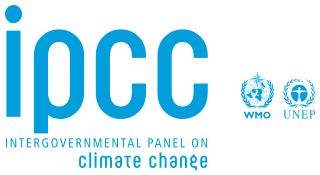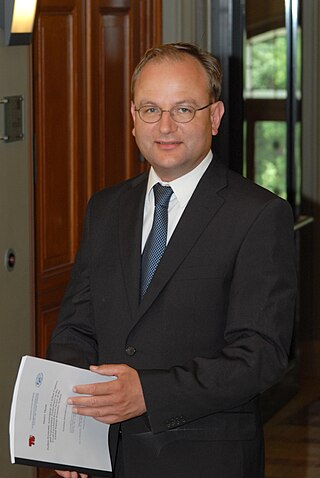Related Research Articles

The Intergovernmental Panel on Climate Change (IPCC) is an intergovernmental body of the United Nations. Its job is to advance scientific knowledge about climate change caused by human activities. The World Meteorological Organization (WMO) and the United Nations Environment Programme (UNEP) established the IPCC in 1988. The United Nations endorsed the creation of the IPCC later that year. It has a secretariat in Geneva, Switzerland, hosted by the WMO. It has 195 member states who govern the IPCC. The member states elect a bureau of scientists to serve through an assessment cycle. A cycle is usually six to seven years. The bureau selects experts to prepare IPCC reports. It draws the experts from nominations by governments and observer organisations. The IPCC has three working groups and a task force, which carry out its scientific work.
Drew Shindell is a physicist and a climate specialist and professor at Duke University's Nicholas School of the Environment. He is listed as an ISI Highly Cited Researcher. He was a chapter lead of the Intergovernmental Panel on Climate Change (IPCC) October 8, 2018 Special Report on Global Warming of 1.5 °C as well as on the Intergovernmental Panel on Climate Change's Fifth Assessment Report in 2013. He has testified on climate issues before both houses of the US Congress, at the request of both parties. His research concerns natural and human drivers of climate change, linkages between air quality and climate change, and the interface between climate change science and policy. He has been an author on more than 200 peer-reviewed publications and received awards from Scientific American, NASA, the EPA, and the NSF.

Climate change mitigation is action to limit climate change by reducing emissions of greenhouse gases or removing those gases from the atmosphere. The recent rise in global average temperature is mostly caused by emissions from fossil fuels burning. Mitigation can reduce emissions by transitioning to sustainable energy sources, conserving energy, and increasing efficiency. In addition, CO2 can be removed from the atmosphere by enlarging forests, restoring wetlands and using other natural and technical processes, which are grouped together under the term of carbon sequestration.

The economics of climate change concerns the economic aspects of climate change; this can inform policies that governments might consider in response. A number of factors make this and the politics of climate change a difficult problem: it is a long-term, intergenerational problem; benefits and costs are distributed unequally both within and across countries; and both the scientific consensus and public opinion on climate change need to be taken into account.
The Burtoni Award was created in 2003 by a group of leading experts and policy makers in the field of climate change. It is named for the Canadian science pioneer Ian Burton. Its purpose is to recognize outstanding contributions to the science of adaptation to climate change. The award is named after the first recipient of the award, Ian Burton, an emeritus professor at the University of Toronto and a pioneer in the field of adaptation to climate change and extreme events and disasters. Ian has contributed to three assessment reports of the IPCC and the recent Special Report on Extremes (SREX).

The Potsdam Institute for Climate Impact Research is a German government-funded research institute addressing crucial scientific questions in the fields of global change, climate impacts, and sustainable development. Ranked among the top environmental think tanks worldwide, it is one of the leading research institutions and part of a global network of scientific and academic institutions working on questions of global environmental change. It is a member of the Leibniz Association, whose institutions perform research on subjects of high relevance to society.

Claudia Kemfert is a German economics expert in the areas of energy research and environmental protection. She is a Professor of Energy Economics and Sustainability at the Hertie School of Governance in Berlin. She heads the Energy, Transportation, and Environment department at the German Institute for Economic Research.

Ottmar Georg Edenhofer is a German economist who is regarded as one of the world's leading experts on climate change policy, environmental and energy policy, and energy economics. His work has been heavily cited. Edenhofer currently holds the professorship of the Economics of Climate Change at the Technical University of Berlin. Together with Earth scientist Johan Rockström, economist Ottmar Edenhofer is scientific director of the Potsdam Institute for Climate Impact Research (PIK), representing the interdisciplinary and solutions-oriented approach of the institute. Furthermore, he is director of the Mercator Research Institute on Global Commons and Climate Change (MCC). From 2008 to 2015 he served as one of the co-chairs of the Intergovernmental Panel on Climate Change (IPCC) Working Group III "Mitigation of Climate Change".

Saleemul Huq is a Bangladeshi-British scientist and has been the Director of the International Centre for Climate Change & Development (ICCCAD) based in Bangladesh, also Professor at Independent University, Bangladesh (IUB). He was elected one of Nature's 10 Ones in 2022.

The economics of climate change mitigation is the part of the economics of climate change related to climate change mitigation, that is actions that are designed to limit the amount of long-term climate change. Mitigation may be achieved through the reduction of greenhouse gas (GHG) emissions and the enhancement of sinks that absorb GHGs, for example forests.

The contributions of women in climate change have received increasing attention in the early 21st century. Feedback from women and the issues faced by women have been described as "imperative" by the United Nations and "critical" by the Population Reference Bureau. A report by the World Health Organization concluded that incorporating gender-based analysis would "provide more effective climate change mitigation and adaptation."

Co-benefits of climate change mitigation are the benefits related to mitigation measures which reduce greenhouse gas emissions or enhance carbon sinks.

The Mercator Research Institute on Global Commons and Climate Change (MCC) conducts research and fosters dialogue about how the global commons, such as the atmosphere and the oceans, might be used and shared by many yet nevertheless be protected. In 2021, The International Center for Climate Governance ranks MCC among the top ten think tanks worldwide for the fourth consecutive year.
Andreas Löschel is a German economist currently holding the chair of Energy and Resource Economics at the University of Münster. He is the director of the Centre of Applied Economic Research Münster (CEAW). His research interests include applied microeconomics, energy economics and the economics of climate change. He is ranked among the most influential economists in his field. In an annual Frankfurter Allgemeine Zeitung Ranking, he is among the 25 most influential economists in Germany.

A carbon budget is "the maximum amount of cumulative net global anthropogenic carbon dioxide emissions that would result in limiting global warming to a given level with a given probability, taking into account the effect of other anthropogenic climate forcers". When expressed relative to the pre-industrial period it is referred to as the total carbon budget, and when expressed from a recent specified date it is referred to as the remaining carbon budget.

Katherine Calvin is an earth scientist at the Joint Global Change Research Institute (JGCRI). She researches human use of global resources using Earth modeling systems at JGCRI under the direction of Pacific Northwest National Laboratory (PNNL) and the University of Maryland. She has contributed to the third US National Climate Assessment as well as two special reports by the Intergovernmental Panel on Climate Change (IPCC).

The Sixth Assessment Report (AR6) of the United Nations (UN) Intergovernmental Panel on Climate Change (IPCC) is the sixth in a series of reports which assess scientific, technical, and socio-economic information concerning climate change. Three Working Groups covered the following topics: The Physical Science Basis (WGI); Impacts, Adaptation and Vulnerability (WGII); Mitigation of Climate Change (WGIII). Of these, the first study was published in 2021, the second report February 2022, and the third in April 2022. The final synthesis report was finished in March 2023.
Sabine Fuss is a German climate scientist. She heads the "Sustainable Resource Management and Global Change" working group at the Mercator Research Institute on Global Commons and Climate Change (MCC). She is a professor at Humboldt University of Berlin.
Joeri Rogelj is a Belgian climate scientist working on solutions to climate change. He explores how societies can transform towards sustainable futures. He is a Reader in Climate Science and Policy at the Centre for Environmental Policy (CEP) and Director of Research at the Grantham Institute – Climate Change and Environment, both at Imperial College London. He is also affiliated with the International Institute for Applied Systems Analysis. He is an author of several climate reports by the Intergovernmental Panel on Climate Change (IPCC) and the United Nations Environment Programme (UNEP), and a member of the European Scientific Advisory Board for Climate Change.

Youba SokonaFAAS FTWAS (born 23 May 1950) is a Malian expert in the fields of energy and sustainable development, particularly in Africa. He has been the vice-chair of the Intergovernmental Panel on Climate Change (IPCC) since October 2015 and a lead author at the IPCC since 1990.
References
- ↑ "Felix Creutzig appointed professor". MCC Berlin. Retrieved 2 January 2017.
- ↑ Creutzig, Felix. Sufficient encoding of dynamical systems (Thesis). Humboldt-Universität zu Berlin. Retrieved 8 July 2022.
- ↑ "Working Group III contribution to the IPCC Sixth Assessment Report (AR6-WG3)". IPCC. Retrieved 1 May 2020.
- ↑ "Two MCC researchers among the most scientifically influential worldwide". MCC Berlin. Retrieved 6 December 2022.
- ↑ "Klimaschutzrat Berlin" . Retrieved 6 December 2022.
- ↑ "Piers Sellers international climate awards winners announced" . Retrieved 6 December 2022.